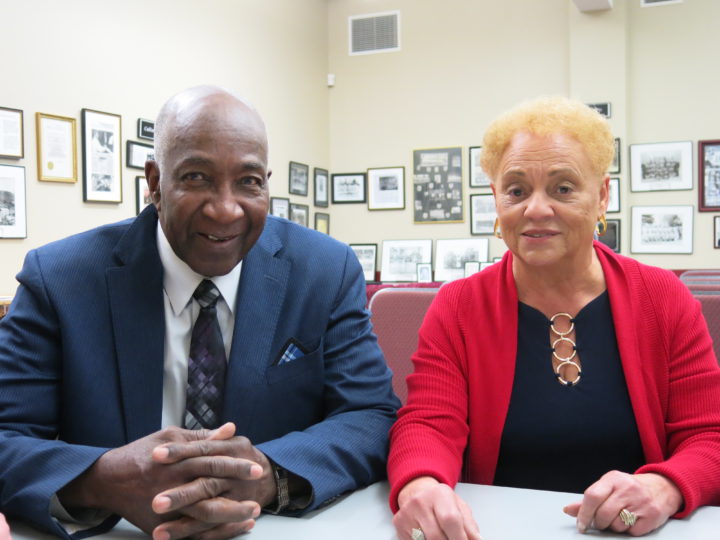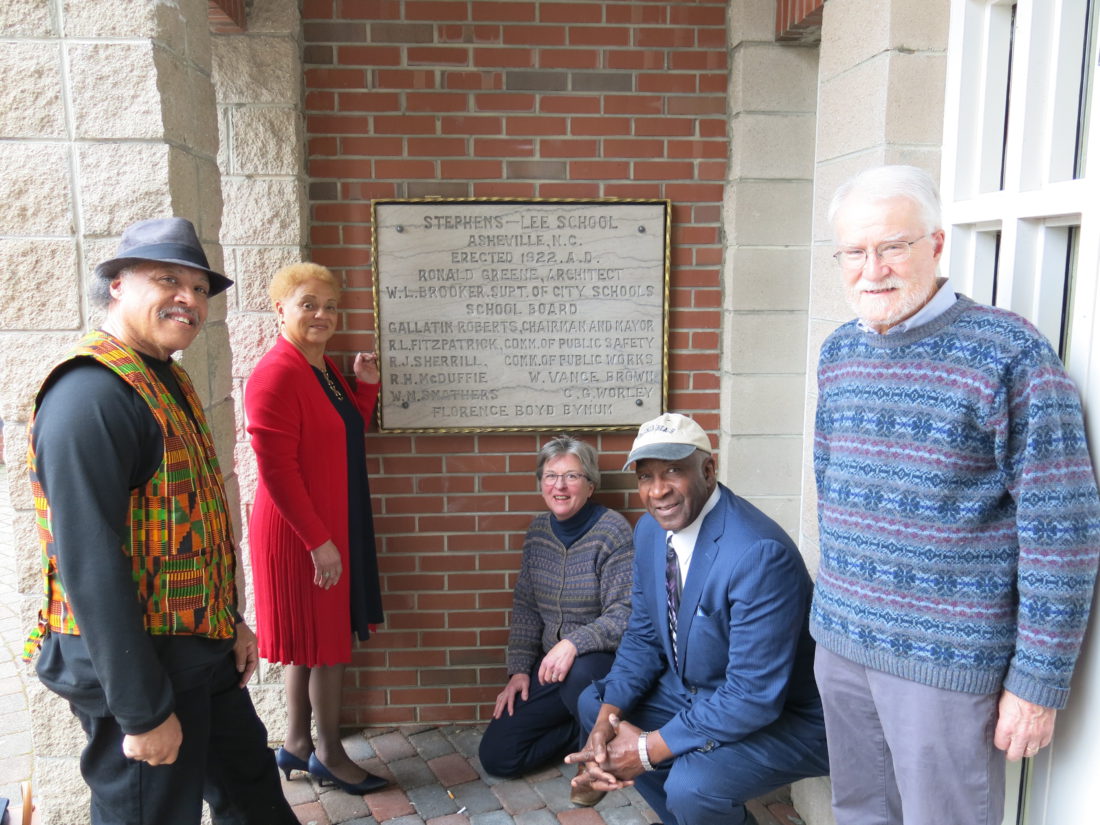When Zoe Rhine booked a tour with Hood Huggers International, she had no idea the rabbit hole she was about to go down. With over two decades of experience working in the North Carolina Room at Pack Library, Rhine’s grasp of Asheville’s past is extensive. But on a spring day in 2017, she and members of the N.C. Room board discovered aspects of the city’s African-American history that were far less familiar.
Of particular interest, remembers Rhine, was the tour’s final stop at the Stephens-Lee Recreation Center. Its parking lot occupies the former site of the high school, which was razed in 1975; the center itself originally served as the school’s gymnasium.
Once commonly referred to as “The Castle on the Hill,” the erstwhile all-black institution opened in 1923 and remained operational until 1965. When it closed, students transferred to the then-recently built, all-black South French Broad High School (later repurposed as Asheville Middle). In 1969, once the city officially integrated its schools, these same students moved once more to Asheville High.
Though Rhine and her group of local historians had a firm grasp on those historical details, their curiosity was piqued when Hood Huggers’ founder and tour guide DeWayne Barton shared his mother’s yearbook. Details emerged about the staff, including their educational aspirations and achievements.
Later, as the tour made its way inside the recreation center, where historical pictures line the hallway, one of the board members mused, “I wonder what happened to these teachers after integration?”
The question, Rhine says, “planted a seed inside my mind.” Soon the seed sprouted and took root, leading Rhine on a two-year research project, focusing specifically on the school’s faculty in its penultimate year (the latest available annual Rhine could locate, dictating her study’s focus).
On Tuesday, April 9, from 6-8 p.m., she and fellow researcher Joe Newman will present findings from that effort at the Stephens-Lee Recreation Center. A Tribute to the Faculty of Stephens-Lee will highlight the educational achievements of the school’s staff, as well as explore the positions these educators obtained following the integration of the city school system.
Immediately after the presentation, Friends of the N.C. Room board member Roy Harris will moderate a panel discussion featuring Stephens-Lee graduates Oralene Simmons, Sarah Hart, Richard Bowman and the Rev. L.C. Ray.
‘Truly exceptional’
Prior to retiring to Asheville in 2007, Newman taught in the College of Education and Professional Studies at the University of South Alabama. In 2018, the professor emeritus returned his attention to one of his areas of academic specialization — the history of education — joining Rhine in her research of Stephens-Lee.
“It seems to have all the marks of a school that was truly exceptional,” Newman says. In 1964, he notes, 20 of the school’s 34 faculty members held master’s degrees in education. “That’s 59 percent of the overall staff,” he notes.
In a period of American history when higher education was not readily available for African-Americans, particularly those in the Jim Crow South, this is an extraordinary statistic, Newman emphasizes. On account of the country’s segregation laws, he continues, many of the Stephens-Lee instructors earned their undergraduate degrees from private, historically black colleges, including Shaw University, Howard University, Fisk University and Bennett College.
When it came time to enroll in graduate school programs, many of these same teachers headed north to public universities, since many Southern institutions were less than welcoming to black candidates. Of the staff’s 20 teachers to earn master’s degrees, 12 took courses at Teachers College, Columbia University. According to Newman, the university’s popularity among Stephens-Lee teachers eventually led the college to create an outreach program, bringing summer courses directly to Asheville.
Part of the staff’s motivation, says Newman, may have grown out of the high school’s own expectations and demands. In several archival interviews, he notes, former teachers discuss the four-year, up-or-out policy at Stephens-Lee. “If you were a brand-new hire with a bachelor’s degree, you had four years to earn a master’s degree, or they were going to get somebody else for your job,” he explains.
‘Others raising others’
The school’s high expectations extended well beyond the staff, says Ray. A member of the 1957 graduating class, Ray remembers a demanding curriculum, led by an equally demanding faculty. When it came to assignments and projects, Ray says, the teachers “almost threatened you, saying, ‘You’re going to do it, boy, one way or another; otherwise, I’m going to take you into the cloakroom.’”

At the same time, he adds, the school’s teachers were compassionate and uplifting role models, as well as active members of the community. They lived in the same neighborhood and attended the same churches as their students. “It was more family-oriented,” he explains. “Others raising others.”
And though much has been gained through integration, Ray pines for some of what was lost in the process. “That family union … that commonality and respect that we are each other’s keeper … I feel we had a lot of that,” he say. “It’s dog-eat-dog now.”
Still, Ray contends, “I wouldn’t want to go back to ’57. I just wouldn’t. I don’t think anyone else would,” he says, without elaborating.
Simmons, who entered Stephens-Lee the year Ray graduated, echoes some of the pastor’s sentiments. “I had the feeling that I belonged to a community,” she writes in an email exchange. And though integration brought with it a stronger sense of equality, she continues, “the sense of community was lost.”
Additional loss came with the 1975 demolition of the former school’s main building. Simmons remembers an overwhelming sadness when the structure was razed. “Gone was the Castle on the Hill, which held so many memories and history,” she says.
Ray remembers experiencing a similar reaction, along with regret. “We were not aggressive enough,” he laments. “It’s possible we could have preserved it. … We could have put a little more pressure on Council.”
His disappointment in the structure’s loss, however, is eased by his continued gratitude for what the former school equipped him with, long after its bricks came tumbling down.
“It shaped me as a community organizer,” Ray says. “Several of my instructors at Stephens-Lee — I didn’t know it then — but they were shaping me. Not so much to be a preacher but to be a leader.”
‘Bumpy start’
Long after the school closed, Rhine says, many of its former staff members continued to teach in Asheville.
Harris, who will moderate the upcoming event, considers this a crucial detail in the school’s history. For many in the community, he says, a false narrative persists. “Folks tend to think every teacher got fired,” he says. “But we’re finding out that wasn’t necessarily correct.”
According to Rhine’s research, 22 of the school’s instructors were reassigned to South French Broad High School in 1966. Three years later, 17 of these teachers made the switch to Asheville High.
The transition didn’t go without a hitch. “Integration got off to a bumpy start in Asheville, like it did in other communities,” says Newman. On Sept. 29, 1969, roughly 200 African-American students walked out of Asheville High School with a list of grievances concerning the unfair treatment they experienced at their new school. (See “Newspaper coverage of the Asheville High walkout, 1969,” Aug. 15, 2017, Xpress)
In response to the protest, Newman says, a group of teachers, including former Stephens-Lee instructors, worked together to confront the issues raised by the school’s African-American students.
Learning from our past
As Harris sees it, the upcoming discussion at the Stephens-Lee Recreation Center underscores an important insight for all members of the community. “Categorize your history,” he says. “Put it in a library. Do whatever it takes so that when your great-grandkids come back to look for you — and they will come back to look for you — that they’ve got a place to start.”
Like many of his colleagues at the N.C. Room, Harris believes the past can help inform the present. It may not present clear-cut answers, he notes, but it can offer ideas, as well as provide a basis for comparison.
For example, he points to the current achievement gap between the city’s black and white students, which is the largest of any of the 115 school districts in the state. Throughout his preparations for the upcoming presentation, Harris says, the present-day inequities returned to him again and again.
“I have conflicting views,” says Harris, who served on the Asheville City Board of Education from 1995-2002. His own daughters, he notes, went through the school system in the early 2000s. Both graduated and went on to earn college degrees. “So I know there are African-American children who come out of this system and go on to thrive,” he says. “But then you look at the current dropout rates and the achievement gap you wonder: What’s going on?”
Harris believes the school system is working in earnest to right the ship. But there’s no denying, he states, that the current stats are disheartening. And though he acknowledges there is no simple solution to the problem, his thoughts loop back to the Stephens-Lee research.
Though neither explicit nor precise in its guidance, Harris says, “Maybe there’s something to be gained from this study here.”
WHAT: A Tribute to the Faculty of Stephens-Lee
WHERE: Stephens-Lee Recreation Center, 30 George Washington Carver Ave. avl.mx/4ji
WHEN: Tuesday, April 9, 6-8 p.m. Free



Delightful and insightful article.